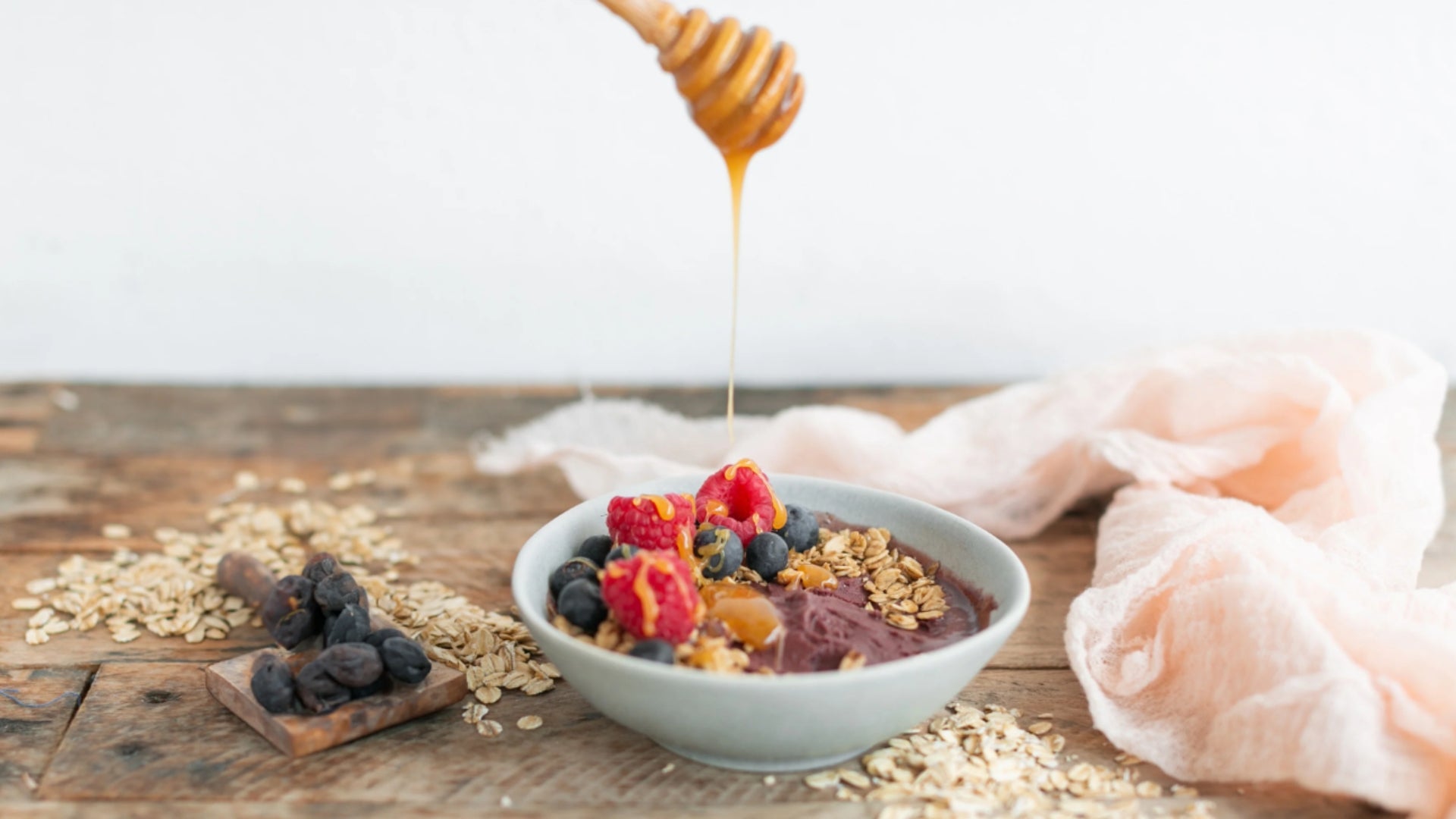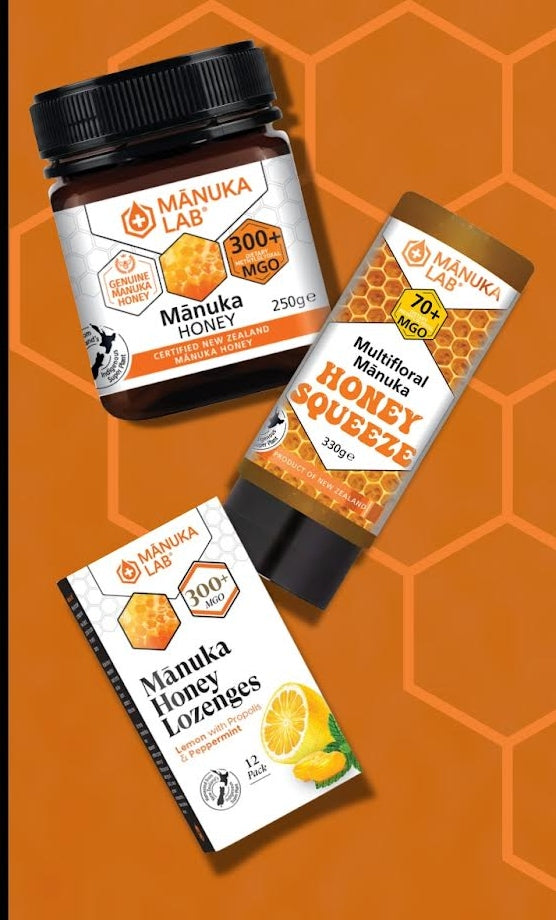

Manuka honey is produced when bees convert nectar into a sugary syrup through a process of digestion and evaporation. It has been around for centuries, not only as a food source but also for its well-known medicinal properties. Recognised for its ability, for example, to help a sore throat, enhance energy levels, treat skin conditions and support overall wellness, manuka honey is much more than a mere treat. Below, we look at the source of manuka honey, as well as some other key information including what is Methylglyoxal (MGO) and Non-Peroxide Activity (NPA).
New Zealand: The Source of Manuka Honey
New Zealand is renowned for its lush, unspoiled landscapes, and the country's unique ecosystem plays a crucial role in the production of the world-renowned manuka honey. The native manuka bush, or Leptospermum Scoparium, thrives in New Zealand's rich soils and temperate climate, providing bees with the perfect environment to collect the nectar that gives manuka honey its distinctive properties.
Describing New Zealand's Ecosystem
New Zealand's wilderness offers an almost untouched haven for the manuka bushes to grow wild. The biodiversity, along with the isolation of New Zealand, means that the manuka nectar collected by the bees is highly concentrated with the compounds responsible for the honey's unique characteristics. The balance of rainfall, sunshine, and native flora all contribute to the high-quality production of this special honey.
The Role of New Zealand Bees in Creating Manuka Honey
Bees in New Zealand are crucial to the development of manuka honey. They collect nectar from the manuka bush, and through their natural process of honey creation, the nectar is transformed into manuka honey. The honey contains dihydroxyacetone, a compound found in high concentration within the nectar of manuka flowers, which later converts into Methylglyoxal (MGO), giving the honey its powerful properties.
Regulatory Standards in New Zealand for Manuka Honey Production
New Zealand takes the purity and authenticity of its manuka honey very seriously. Strict regulatory standards have been established to ensure the highest quality. Producers must adhere to rigorous testing to verify the presence of unique signature compounds that qualify manuka honey. These standards protect consumers, ensuring the manuka honey they purchase is genuine.
Understanding the Definition of MGO in Manuka Honey - Methylglyoxal
If you're familiar with manuka honey, you've likely come across the term 'MGO'. This acronym stands for Methylglyoxal, a naturally occurring compound that sets Manuka honey apart from other types of honey.
What is MGO?
Methylglyoxal (MGO) is a compound found in significant quantities in manuka honey. Derived from the nectar of the manuka tree, native to New Zealand, this naturally occurring chemical is found only in manuka nectar. This compound is formed from dihydroxyacetone (DHA), which is present in the nectar of the manuka flowers.
Why is MGO Important?
MGO is a critical factor in determining the potency and medicinal properties of manuka honey. Its presence is associated with the honey's antibacterial activity, making it effective against a wide range of bacteria. This unique antibacterial property is one of the reasons why manuka honey is highly prized and sought after for both culinary and medicinal uses.
Understanding Non-Peroxide Activity in Manuka Honey (NPA)
When delving into the world of manuka honey, you'll likely come across the term 'NPA'. This stands for Non-Peroxide Activity, a crucial measure that sets manuka honey apart from other types of honey.
What is NPA?
Non-Peroxide Activity is a measure of the antibacterial potency of manuka honey. Manuka honey is renowned for its unique antibacterial properties, largely attributed to the presence of methylglyoxal (MGO), dihydroxyacetone (DHA), and hydrogen peroxide.
Why is NPA Important?
The NPA rating is significant because it quantifies the non-peroxide antibacterial activity of manuka honey, providing consumers with an indication of its potency against bacteria. This rating system helps consumers understand the effectiveness of manuka honey for various purposes, such as general immune support and more. The higher the NPA rating, the greater the antibacterial potency of the manuka honey.
Awareness Around Counterfeit Manuka Honey: How to Identify the Genuine Product
Manuka honey is highly valued for its health benefits, but its popularity has led to many counterfeit products. To ensure you buy genuine manuka honey, look for certification from reputable organisations. Verify the Methylglyoxal (MGO) content, with higher levels indicating stronger antibacterial properties. Ensure the honey is from New Zealand and check for high-quality, tamper-evident packaging. The label should provide clear information on MGO ratings, NPA ratings, origin and more. Purchase from trusted retailers. Following these tips will help you get authentic manuka honey and its full benefits.
Final Thoughts
New Zealand is the leading source of manuka honey, thanks to its unique environment and ecosystem that supports the growth of the manuka bush. Understanding the importance of Methylglyoxal (MGO) and Non-Peroxide Activity (NPA) highlights the unique antibacterial properties that make manuka honey so valued. To avoid counterfeit products and enjoy the full benefits of genuine manuka honey, always check for reputable certification, verify MGO content, confirm the origin, and buy from trusted retailers. This ensures you receive high-quality, authentic manuka honey renowned for its health benefits.
About Manuka Lab
Manuka Lab are leading expert suppliers of high-quality manuka honey in the UK. Our genuine New Zealand manuka honey is sustainably harvested from New Zealand's indigenous 'Super Plant' - this is grown in the remotest areas of the East Cape region, ensuring quality, potency, and origin.
See the full range of manuka honey products on our website. Alternatively, email us at wecare@manukalab.co.uk should you have any questions or require further information regarding our manuka honey products.
Manuka Lab: MGO certified, complies with the New Zealand Government definition for manuka honey, produced and packed in New Zealand.
Embrace the Natural Elixir - Incorporate manuka honey into Your Lifestyle.



